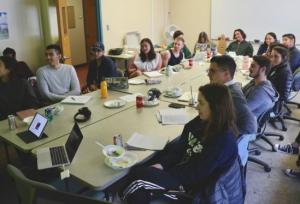Michael Krepon had no idea that his guest appearance at UC Santa Barbara would be so timely. A co-founder of the Stimson Center, one of Washington’s top think tanks, Krepon was invited to campus by Neil Narang to speak to his class about nuclear security in South Asia. Just two weeks earlier, India and Pakistan, both of whom possess large stockpiles of nuclear weapons, edged closer toward the brink of war.
For the 20 students in Narang’s “Nuclear Weapons and International Security” course, Krepon’s talk offered an important real-world glimpse into a life-and-death topic that, paradoxically, has been fading from the public’s imagination and policy priorities.
A rising associate professor of political science who specializes in global security issues, Narang saw the class as a unique opportunity to give a select group of high-achieving fourth-year undergraduates the chance to learn directly from some leading experts in nuclear security and strategy.
“I don’t think there is a single more relevant course that I can teach today,” Narang said. “In one way or another, nuclear weapons appear to be at the heart of some of the most pressing foreign policy challenges. From emerging crises with North Korea and Iran, to the rapid rise of China, to the recent breakdown of arms control agreements with Russia, nuclear weapons cast a long shadow across the headlines over the last decade. And yet, I discovered that few students knew the historical or technical background behind nuclear weapons, the patterns and forces behind nuclear weapons proliferation, or the grave consequences of these weapons for international and regional security.”
The new course originated when the Stanton Foundation approached Narang about developing a class on nuclear security, one of its philanthropic priorities. The foundation was searching across U.S. universities for exceptional instructors with expertise in the highly specialized field of nuclear security, and Narang — who served as a senior advisor in the Office of the Secretary of Defense for Policy on a Council on Foreign Relations fellowship — fit both criteria.
The foundation offered Narang the financial support and freedom to design his ideal course, so he requested $10,000 to fly in guest speakers from around the country. “It can be humbling to admit this, but it was important to me that the students heard from the very best scholars and policymakers on each topic, and that meant I needed to fly in some of my colleagues from other universities and the Pentagon,” he said. “I wanted to bring in the very best people on each topic.”
But there was a catch: For the foundation to agree, the university would need to match that $10,000 for three more years to support the class. But without a spare $30,000 lying about the campus, the foundation’s offer was about to disappear. And then an administrator suggested Narang approach the university’s Orfalea Center for Global & International Studies, led by director Michael Stohl. It was the right call.
“I reached out to Michael Stohl and he said, ‘Consider it done.’ ” Narang said. “He immediately recognized the value of the course and earmarked the money for three years. Thanks to Michael and the Orfalea Center, we have the funds to support the course into the future.”
Stohl even found Narang a classroom — always in tight supply on campus — for the course to meet, and he offered the support of Melissa Bator, academic coordinator of the Orfalea Center. The class, Stohl said, “creates an opportunity for us to bring in the world’s leading experts. I think it has the potential to really direct students’ attention to a crucial issue in global security. This is a problem that is not going away anytime soon. It also creates an opportunity to make the intersection of technology and social science a focal point for UCSB, because all of these experts will think of UCSB students and faculty when working on these issues into the future.”
Related Link:
News Date:
Monday, March 25, 2019
March 26, 2019 - 8:58am







